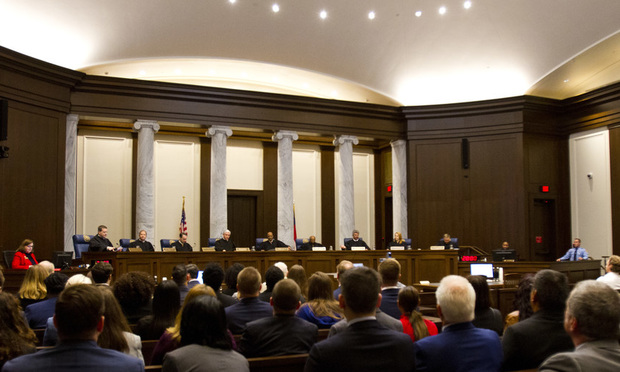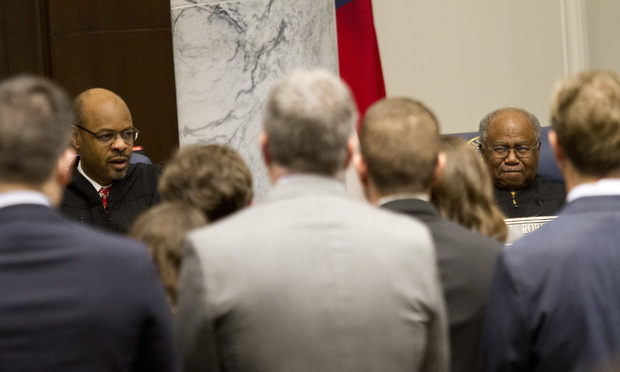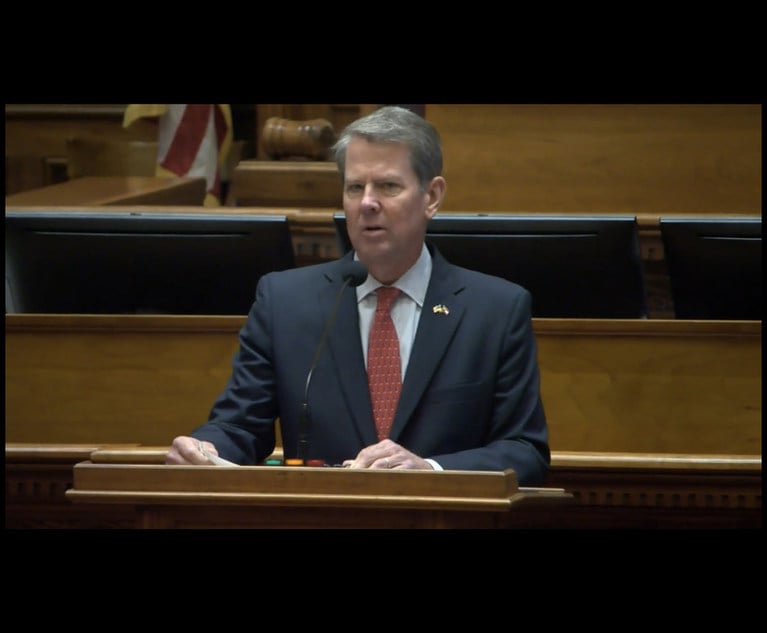Newly Minted Lawyers and a 'Difficult Case' Lead High Court's First Session in New Home
"This is the first building in the state of Georgia's history dedicated to the appellate courts," Chief Justice Harold Melton said. "It shows just how serious our state is in what the judicial branch represents."
January 14, 2020 at 05:54 PM
5 minute read
 The Georgia Supreme Court heard its first oral arguments in its courtroom in the new Nathan Deal Judicial Center. (Photo: John Disney/ALM)
The Georgia Supreme Court heard its first oral arguments in its courtroom in the new Nathan Deal Judicial Center. (Photo: John Disney/ALM)
For its first oral arguments in the new Nathan Deal Judicial Center Tuesday, the Georgia Supreme Court heard appeals in a half-dozen murder cases, plus a challenge to state law regulating lactation consultants.
But the first order of business at the 10 a.m. opening was swearing in about 40 new lawyers in a packed courtroom. With the new lawyers still gathered around the nine-member bench, Chief Justice Harold Melton took a moment to reflect on the historic day.
"This is the first building in the state of Georgia's history dedicated to the appellate courts," Chief Justice Harold Melton said. "It shows just how serious our state is in what the judicial branch represents."
Melton said the oath the new lawyers had just taken is similar to the one judges take—"to uphold and support the Constitution of the United States and the Constitution of the State of Georgia." He said the real meaning is to work in support of justice for all—"rich and poor." He called it a "very intimidating, very humbling charge."
 Chief Justice Harold Melton (left) gives words of wisdom to newly sworn in attorneys to the Supreme Court of Georgia as Justice Robert Benham listens. (Photo: John Disney/ALM)
Chief Justice Harold Melton (left) gives words of wisdom to newly sworn in attorneys to the Supreme Court of Georgia as Justice Robert Benham listens. (Photo: John Disney/ALM)But he added his reasons for hope. "I have confidence because I have the privilege of serving with my sister and brothers on this court," Melton said, naming each one. His voice quivered, and he choked up a bit upon naming the most senior member, Justice Robert Benham, who has said he will retire in March.
"We stand together, and that makes all the difference in the world," Melton said, adding that such was not always the case in the state's history.
"We are so dependent on you," he told the new lawyers. "We count on you to steer us right."
"We're going to give you a hard time when you come up here," Melton said. "But we hope you will see in that it's because we are begging you to steer us right in the law."
Melton added, "We ask that you be diligent. We ask that you be brief."
Melton also sounded a holistic theme. "More importantly, we ask you to take care of yourselves," he said. "You're greatest skill as a lawyer is who you are as a person." Melton added, "We want you to be strong, healthy lawyers" but also strong, healthy brothers, sisters, spouses and parents."
After the crowd of new lawyers and well-wishers emptied from the courtroom, the justices moved on to their first case in their new $131 million home. It was the combined appeal of Albert and Ashley Debolbot, a military couple convicted of murder and sentenced to life in prison for the 2008 death of their newborn daughter McKenzy in Columbus.
Their lawyers split the appellees' alloted 20 minutes. They argued that the couple was denied a fair trial, including the ability to present their medical expert witnesses who would have testified that McKenzy had a medical condition at birth that caused the head injuries that led to her death. They said the parents were convicted of a murder that never happened.
Arguing for the mother was Carrie Sperling of the Wisconsin Innocence Project and a professor at the University of Wisconsin Law School in Madison.
Her first target was the prosecutor's directive to jurors in closing argument that they did not have to be certain of guilt beyond a reasonable doubt—or even beyond 51%—in order to convict the parents.
Sperling called it an "unthinkable characterization of the state's burden of proof." She added a question: "How can anyone have faith in the criminal justice system if we can send someone to prison for life without the possibility of parole without being 51% sure of their guilt?"
Arguing for the father was A. James Anderson of Robbins Kaplan in Atlanta. Anderson followed with more detail about the trial judge and the prosecutor preventing the jury from knowing about abnormalities, including a 10 times greater than normal expansion in head circumference before the baby left the hospital.
Senior assistant attorney general Paula Smith argued for the state, calling the couple's claim about a medical cause of death "a novel theory." The justices pelted her with questions about the fairness of the trial.
When they finished, Melton thanked the attorneys and said, "This is a very difficult case."
The cases are: Albert Debolbot v. the State, No. S19A1474, and Ashley Debelbot v. the State, No. S19A1475.
This content has been archived. It is available through our partners, LexisNexis® and Bloomberg Law.
To view this content, please continue to their sites.
Not a Lexis Subscriber?
Subscribe Now
Not a Bloomberg Law Subscriber?
Subscribe Now
NOT FOR REPRINT
© 2025 ALM Global, LLC, All Rights Reserved. Request academic re-use from www.copyright.com. All other uses, submit a request to [email protected]. For more information visit Asset & Logo Licensing.
You Might Like
View All
Georgia Republicans Push to Limit Lawsuits. But Would That Keep Insurance Rates From Rising?
5 minute read
A Plan Is Brewing to Limit Big-Dollar Suits in Georgia—and Lawyers Have Mixed Feelings
10 minute read
Panel to Decide if Governor Should Suspend Georgia Lawyer From Elected Post
4 minute readTrending Stories
- 1Commentary: Tort Reform Is a Misleading Promise
- 2The Lawyers Waging the Legal Fight Against the Trump Administration
- 3McDermott's Onetime London Leader Headed to Pillsbury
- 4A&O Shearman To Lose Another Five Lawyers to EY
- 5Pearl Cohen Enters San Francisco Market Via Combination With IP Boutique
Who Got The Work
J. Brugh Lower of Gibbons has entered an appearance for industrial equipment supplier Devco Corporation in a pending trademark infringement lawsuit. The suit, accusing the defendant of selling knock-off Graco products, was filed Dec. 18 in New Jersey District Court by Rivkin Radler on behalf of Graco Inc. and Graco Minnesota. The case, assigned to U.S. District Judge Zahid N. Quraishi, is 3:24-cv-11294, Graco Inc. et al v. Devco Corporation.
Who Got The Work
Rebecca Maller-Stein and Kent A. Yalowitz of Arnold & Porter Kaye Scholer have entered their appearances for Hanaco Venture Capital and its executives, Lior Prosor and David Frankel, in a pending securities lawsuit. The action, filed on Dec. 24 in New York Southern District Court by Zell, Aron & Co. on behalf of Goldeneye Advisors, accuses the defendants of negligently and fraudulently managing the plaintiff's $1 million investment. The case, assigned to U.S. District Judge Vernon S. Broderick, is 1:24-cv-09918, Goldeneye Advisors, LLC v. Hanaco Venture Capital, Ltd. et al.
Who Got The Work
Attorneys from A&O Shearman has stepped in as defense counsel for Toronto-Dominion Bank and other defendants in a pending securities class action. The suit, filed Dec. 11 in New York Southern District Court by Bleichmar Fonti & Auld, accuses the defendants of concealing the bank's 'pervasive' deficiencies in regards to its compliance with the Bank Secrecy Act and the quality of its anti-money laundering controls. The case, assigned to U.S. District Judge Arun Subramanian, is 1:24-cv-09445, Gonzalez v. The Toronto-Dominion Bank et al.
Who Got The Work
Crown Castle International, a Pennsylvania company providing shared communications infrastructure, has turned to Luke D. Wolf of Gordon Rees Scully Mansukhani to fend off a pending breach-of-contract lawsuit. The court action, filed Nov. 25 in Michigan Eastern District Court by Hooper Hathaway PC on behalf of The Town Residences LLC, accuses Crown Castle of failing to transfer approximately $30,000 in utility payments from T-Mobile in breach of a roof-top lease and assignment agreement. The case, assigned to U.S. District Judge Susan K. Declercq, is 2:24-cv-13131, The Town Residences LLC v. T-Mobile US, Inc. et al.
Who Got The Work
Wilfred P. Coronato and Daniel M. Schwartz of McCarter & English have stepped in as defense counsel to Electrolux Home Products Inc. in a pending product liability lawsuit. The court action, filed Nov. 26 in New York Eastern District Court by Poulos Lopiccolo PC and Nagel Rice LLP on behalf of David Stern, alleges that the defendant's refrigerators’ drawers and shelving repeatedly break and fall apart within months after purchase. The case, assigned to U.S. District Judge Joan M. Azrack, is 2:24-cv-08204, Stern v. Electrolux Home Products, Inc.
Featured Firms
Law Offices of Gary Martin Hays & Associates, P.C.
(470) 294-1674
Law Offices of Mark E. Salomone
(857) 444-6468
Smith & Hassler
(713) 739-1250







